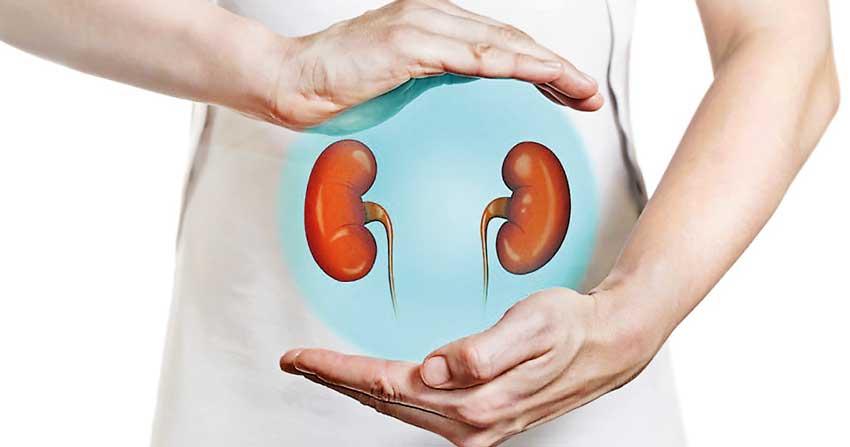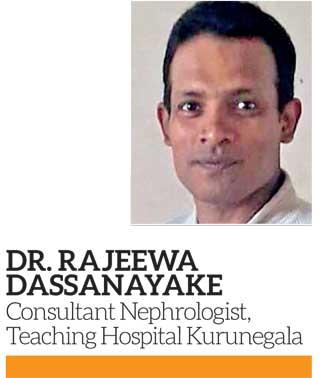09 Jul 2021 - {{hitsCtrl.values.hits}}

 At a time when COVID-19 doesn’t seem to be having a clear denouement any sooner its debilitating effects on health are becoming quite serious, invading almost all the systems of the body.
At a time when COVID-19 doesn’t seem to be having a clear denouement any sooner its debilitating effects on health are becoming quite serious, invading almost all the systems of the body.
To talk about its renal complications and the impact on patients already diagnosed with Chronic kidney disease and how Sri Lankan health care system has implemented policies and revised guidelines to utilise limited resources, to provide such patients with an optimal care, during the crisis situation, we had a discussion with Dr Rajeewa Dassanayake, Consultant Nephrologist, Teaching Hospital Kurunegala.
A leading global health problem
“Chronic kidney disease is a leading health issue worldwide with a prevalence of around 13.5%. It is often associated with comorbidities like Hypertension, diabetes and cardiovascular disease whilst COVID infection has been shown to own a marked impact even on previously normal kidneys resulting in a significantly worse outcome. In fact its substantial effects on the incidence and management of kidney disease including acute kidney injury (AKI), Chronic kidney diseases and End Stage Renal Failure have resulted in a three fold rise in morbidity and mortality,” said Dr Dassanayake.
COVID- 19 isn’t just about lungs
Renal impairment due to COVID-19 is due to both the action of the virus itself and body’s immunological response towards it. Although, most clinicians focused on complications of the virus, which only involved lungs, heart and and gastro-intestinal system and considered renal involvement as something negligible, recent data shows how its contribution towards COVID-19 associated debilitations and mortality has worsened since the beginning. As a result Acute kidney injury is considered as a marker of disease severity and a negative prognostic factor for survival now, according to Dr.Dassanayake.
CKD vs COVID-the struggle is real
Performing Haemodialysis in affected patients carries significant challenges including the limited availability of resources including staff and Personal protective gears.
“Medical consequences of COVID-19 like coagulopathy (poor blood clotting), and hypoxemia (poorly oxygenated blood) due to acute respiratory distress syndrome are more pronounced in patients with Chronic Kidney Disease. Hence, such patients need to be prioritised for prevenaion and requires intensive treatment if infected. Non infected patients need to be separated from infected patients, in spite of limited resources.
Another major concern is to protect health workers in kidney units, who work in a very high risk environment. The entire staff at the kidney unit at Kurunegala was either infected or quarantined at one point” highlighted
Dr. Dassanayake.
“In our centre the majority of kidney transplant patients with COVID infection succumbed, although survivals were recorded. In contrast, the majority of kidney failure patients on dialysis recovered. In keeping with worldwide trends, we have now temporarily withheld living donor kidney transplants.” the doctor said.
Issues are tackled quite efficiently
The Sri Lanka Society of Nephrology recommends the continuation of out-patient clinics, seeing only the unstable patients and ones having problems to be sorted out while the rest is prescribed with medication to continue with the same treatment plans they are already on.
All patients on routine dialysis should receive dialysis from the respective units with maximum protective measures, followed.
Health care staff is encouraged to create Fixed dialysis schedules where patients are given a time slot for their dialysis to avoid any unnecessary patient encounters.
“Experts suggest patients to avoid public transportation as much as possible, which is not much practical when it comes to financial and social issues. In that case, unstable renal patients and those on dialysis and after transplant, should receive hospital transport eventhough its not feasible at the moment” he added.
Patients are advised to reveal COVID-19 related symptoms and contact history
without hesitation.
The way forward
“Overall, satisfactory care has been provided to kidney disease patients in our setting where no patients have been deprived of lifesaving treatments such as dialysis, on account of COVID infection. Even at the time when the entire kidney unit staff were infected or quarantined, lifesaving treatments were continued, with the support of other hospitals, and the staff keeping contact with patients and making arrangements on a work from home basis. Other kidney units around the country are also providing good service, in spite of limitations
However, the way forward would be to prioritise kidney disease patients for vaccination, while maintaining urgent and essential treatment services, with strict distancing and isolation. In the meantime, we would welcome support, especially for dialysis patients, who have to bear the additional costs of travelling, in the current financial climate” concludes Dr. Dassanayake.
19 Apr 2024 5 hours ago
19 Apr 2024 5 hours ago
19 Apr 2024 6 hours ago
19 Apr 2024 7 hours ago
19 Apr 2024 8 hours ago